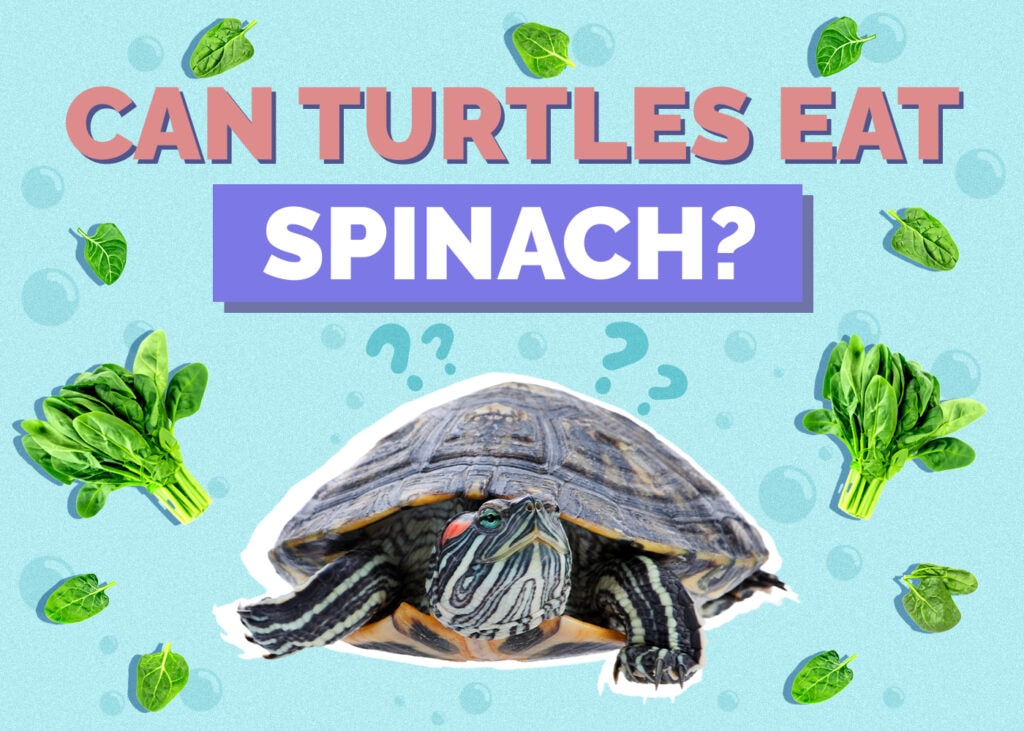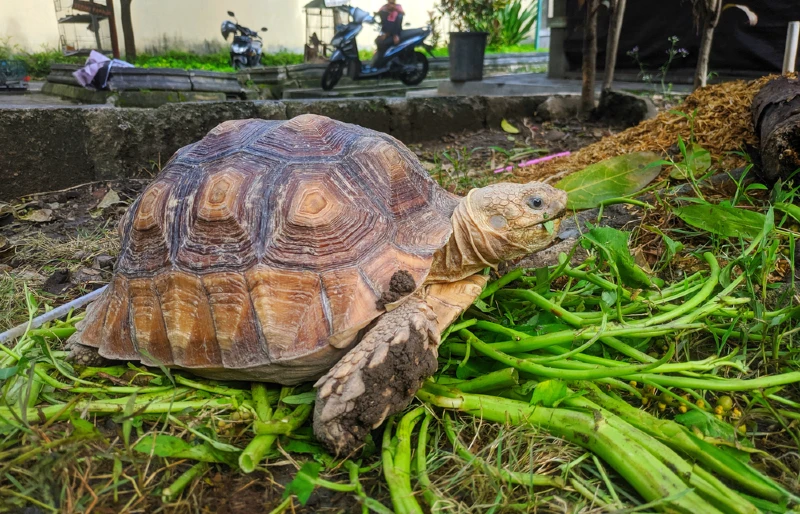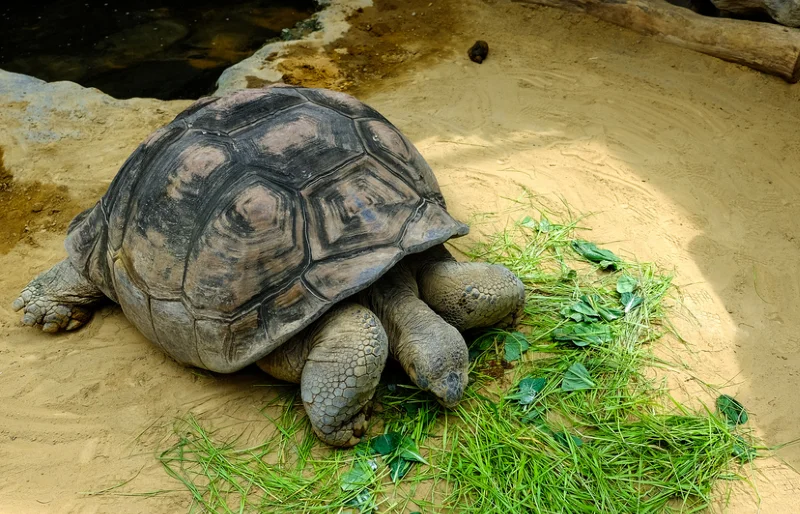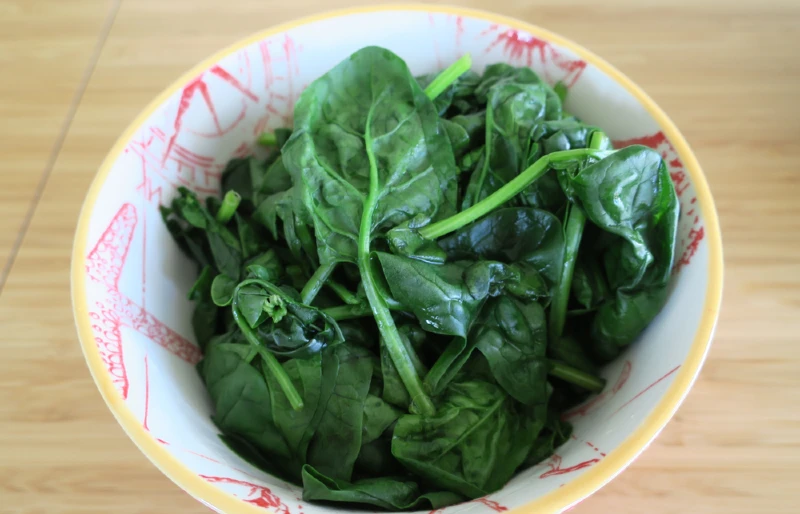Can Turtles Eat Spinach? Nutrition Facts & FAQ
By Ashley Bates
Updated on

Spinach is a leafy green superfood that nutritionists can’t get enough of. We know the bountiful benefits it has for human creatures. But what about turtles? If you thought about adding spinach to your turtle’s daily diet, you did the right thing to check before following through.
So what is the deal? Spinach is suitable for turtles in moderation—but moderation is the keyword here. Find out how much is too much and the consequences of frequent consumption in this article.
Turtles Can Eat Spinach
The word turtle covers 356 species living on land, in water and those such as terrapins living on both. It is therefore imperative to know the dietary needs for the specific turtle that you have. If you have any questions about how to feed your turtle speak to your local exotics veterinarian for advice.
Most turtles can certainly eat spinach from time to time, and it carries a wide range of health perks that can be beneficial to your reptile’s system. However, it does carry some risks. So, we want you to be very well-versed in the pros and cons before choosing to serve it up.
Even though spinach contains a wide variety of healthy vitamins and minerals, it also can severely impact calcium absorption. We all know how crucial calcium is to our reptile friends, so you should be extra careful with portions and frequency.
Spinach contains oxalic acid—an acid that can interfere with the absorption of calcium, putting your turtle at risk for depletion.

Spinach Nutrition Facts
Amount Per 1 Cup
- Calories: 7
- Sodium: 24 mg
- Potassium: 167 mg
- Total Carbohydrates: 1.1 g
- Protein: 0.9 g
- Vitamin C: 8.43mg
- Iron: 0.81mg
- Vitamin B6: 0.058mg
- Magnesium: 23.7mg
- Calcium: 29.7mg
Spinach Benefits
Even though spinach has its risks if you offer it too often, it has a laundry list of benefits too. This leafy green is certainly nutritious—and here are some aspects of spinach that improve health.
- Lutein: Lutein is a type of carotenoid that has anti-inflammatory properties which benefit vision.
- Vitamin K: Vitamin K is responsible for strong bones and blood clotting. It also builds osteocalcin, which helps to build bones.
- Vitamin A: Vitamin A is incredible for vision, healthy immune systems, skin and reproduction.
- Iron: Iron helps the body produce hemoglobin and myoglobin. Hemoglobin is a protein found in red blood cells that carries oxygen from the lungs throughout the body. Myoglobin provides oxygen to muscles.
- Potassium: Potassium works to create normal fluid levels inside bodily cells. It works directly with sodium for full effect.
- Zinc: Zinc boosts immune health to ward off bacteria and viruses. It also helps metabolism function.
- Manganese: Manganese will help form connective tissue in your turtle’s body.
In addition to these benefits, spinach can also play a role in strong shell development and prevent nutritional deficiencies.

Spinach Downfalls
Because spinach is high in fiber, it can cause gas and abdominal pain if your turtle consumes too much. That is because it disrupts the gastrointestinal tract, leading to an increase in abdominal gas and cramping.
If you have never introduced spinach into your turtle’s diet before, it can be a little harsh on the system. Juvenile turtles can have a hard time digesting it. So if you have a turtle that isn’t used to consuming greens, introduce spinach gradually.
In addition to blocking calcium absorption, oxalic acid can be responsible for the development of kidney stones.
How Much Spinach Should Your Turtle Eat?
Some pet parents choose to stay completely away from spinach since it is very high in oxalic acid. However, if you want to add diversity into your turtle’s diet they can benefit from the vitamins and minerals. You can add a little bit to their diet from time to time.
Since spinach contains a high amount of fiber, iron, vitamin A, and vitamin C, it can have a lot of other benefits. However, your turtle can also get this series of vitamins and minerals from other sources.
There are no science-backed recommendations for how much spinach you should feed. A rough guideline is to feed them no more than 4 tablespoons of spinach at a time. Remember that this measurement depends on your turtle’s particular species and age.
Spinach is usually safe enough for your turtle to eat every now and then, but don’t make a habit of it. Because it contains such a high amount of oxalic acid, it should be a small portion of your turtle’s overall diet.
Ultimately, many owners turn to alternative options that don’t carry the same risks.

Wash the Spinach Before Serving
Before you serve your turtle any spinach, it is incredibly important to wash it thoroughly. Spinach can have a number of pesticides and insecticides on it, which can make your turtle very sick.
When you can, it’s always best to buy organic. Plus, certain reptiles can have stomach issues, and spinach can sometimes upset their gastrointestinal tract. For the best benefit, freshly washed spinach is always best.
Cooked Spinach—Is It Safe?
You can feed your turtle both cooked and raw spinach. However, you should always stay away from canned spinach due to the preservatives and salt. If you feed your turtle cooked spinach, never add any additional ingredients apart from leaves and water.
Any additional seasonings can be detrimental to the health of your turtles—so never give them dinner leftovers or pre-seasoned leaves.

Potentially Better Leafy Greens
If you want your turtles to have the benefits of leafy greens in their diet, spinach isn’t your only option. Several other greens are even more beneficial to your turtle’s system. Some include:
- Collard greens
- Mustard greens
- Turnip greens
- Swiss chard
- Bok choy
- Kale
So, certainly explore other avenues to reap the greatest reward for your reptiles. Comparatively, other veggies might be much better more often.
Turtles + Spinach: Final Thoughts
So now you know that turtles can have small amounts of spinach roughly every other day. Too much spinach in their diet will cause some diseases such as overabundance of oxalic acid in the system, which can cancel out calcium consumption. It can also lead to kidney stones.
If you want your turtle to get the benefits of spinach, offer it up well-washed and preferably organic. Also, base it on your turtle’s size and species when it comes to actual measurements.
See also:
- Can Turtles Eat Bread? Vet-Reviewed Nutrition Facts & Safety Guide
- Can Turtles Eat Celery? Vet-Reviewed Nutritional Facts & FAQ
Featured Image Credit: Ponce_photography, Pixabay












